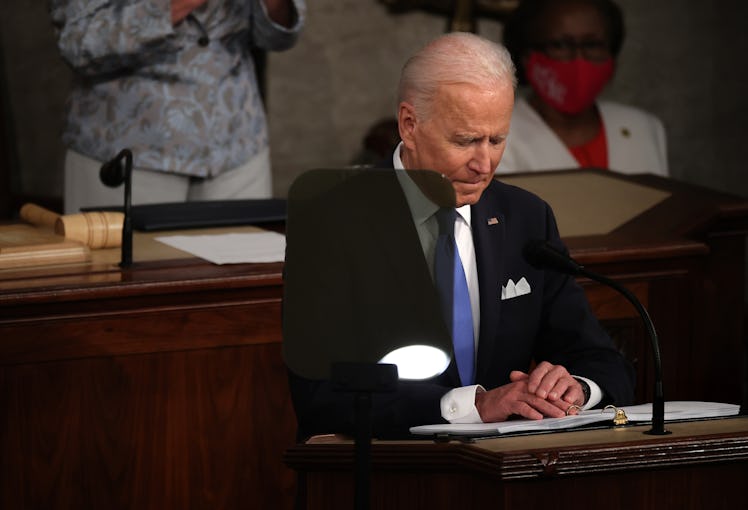
Biden's Quote About Police Reform At The Address To Congress Went Way Beyond Policing
During his first address to a joint session of Congress on April 28, President Joe Biden confronted several of the nation's most pressing issues, including police reform. On multiple occasions, Biden has made it clear he believes police must be held accountable for serious misconduct, and that some measure of reform is necessary. At his 2021 address to Congress, Biden's quote about police reform went way beyond policing, and it showed just how much work America has to do when it comes to addressing its own deep-rooted systemic racism.
"White supremacy is terrorism," Biden said in his speech, succinctly.
"We have all seen the knee of injustice on the neck of Black America," Biden continued. He added that he believed most law enforcement wanted to serve their communities. "Now is our opportunity to make real progress." His comments alluded to the killing of George Floyd, a Black man who was killed in May 2020 after a white police officer, Derek Chauvin, knelt on his neck for around nine minutes. On April 20, 2021, Chauvin was found guilty on charges of second-degree unintentional murder, third-degree murder, and second-degree manslaughter for killing Floyd. Representatives of Chauvin did not reply to Elite Daily's request for comment on the verdict at the time. Since then, officer-involved killings have continued, and public calls for police reform have gained nationwide momentum.
"We have to come together to rebuild trust between law enforcement and the people they serve, to root out systemic racism in our criminal justice system, and to enact police reform in George Floyd’s name," Biden continued.
But importantly, the president took the message about racial equality beyond just policing and criminal justice. Instead, he addressed the need to create and reinforce equitable opportunities.
"With the plans I outlined tonight, we have a real chance to root out systemic racism that plagues American life in many other ways," he said. "A chance to deliver real equity. Good jobs and good schools. Affordable housing. Clean air and clean water. Being able to generate wealth and pass it down through generations. Real opportunities in the lives of more Americans — Black, white, Latino, Asian American, Native American."
This isn't the first time protests against racism have come up in a presidential address to Congress, but not quite with the same vibe. In February 2018, buzz over football player Colin Kaepernick kneeling during the national anthem to protest police violence continued to flare. During his inaugural address to Congress, President Donald Trump affirmed law enforcement — and by extension, sent a strong message of condemnation toward protests against police brutality. "Our task is to respect them, to listen to them, to serve them, to protect them, and to always be worthy of them," Trump said of police officers and law enforcement at the time.
Biden's 2021 remarks come at a time when many people around the country are demanding action against racism and police brutality. In June 2020, congressional Democrats introduced the George Floyd Justice in Policing Act, a civil rights and police reform bill aimed at combating police misconduct, excessive bias, and racial bias in law enforcement. Among other things, the bill includes provisions to ban chokeholds and some no-knock warrants, to charge officers with criminal offenses if they behave "recklessly," and to remove an officer's legal immunity against lawsuits so families have the ability to sue. While the legislation passed in the House on Feb. 24, 2021, it faces an uphill battle in the Senate. In his April 28 speech, Biden called for Congress to act by May 25, the one-year anniversary of Floyd's murder.
"I know the Republicans have their own ideas and are engaged in productive discussions with Democrats," Biden continued. "We need to work together to find a consensus."